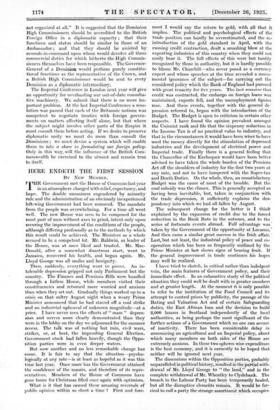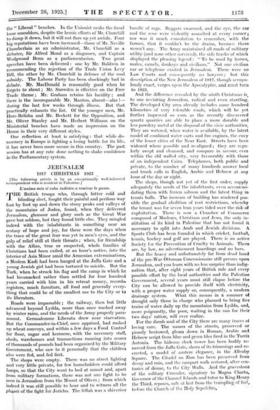HERE ENDETH THE FIRST SESSION
BY NEW MEMBER.
Then, suddenly, everything went to pieces. An in- tolerable depression gripped not only Parliament but the country. The Finance and Pensions Bills were bundled through a listless House, while members visited their constituencies and returned more worried and anxious than when they set out. Gradually things worked up to a crisis on that sultry August night when a weary Prime Minister announced that he had staved off a coal strike and an industrial upheaval of unknown magnitude—at a price. I have never seen the effects of " mass " depres- sion and nerves more clearly demonstrated than they were in the lobby on the day we adjourned for the summer recess. The talk was of nothing but ruin, civil wars, strikes, or, at best, the impending General Election. Government stock had fallen heavily, though the Oppo- sition parties were in even deeper waters.
But now another and no less remarkable change has come. It is fair to say that the situation—psycho- logically at any rate—is at least as hopeful as it was this time last year Once more has the Government attained the confidence of the -masks, and 'therefore of its repre- sentatives. Members of the House of Commons have gone home for Christmas filled once again with optimism.
What is it that has caused these amazing reversals of public opinion within so short a time ? First and fore- most I would say the return to gold, with all that it implies. The political and psychological effects of the trade position can hardly be overestimated, and the re- introduction of the gold standard in April, with the ensuing credit contraction, dealt a smashing blow at the exporting industries of this country when they could not easily bear it. The full effects of this were but tardily recognized by those in authority, but it is hardly possible to blame Mr. Churchill—who never posed as a currency expert and whose speeches at the time revealed a monu- mental ignorance of the subject—for carrying out the considered policy which the Bank of England had pursued with great tenacity for five years. The fact remains that credit was contracted, the embargo on foreign loans was maintained, exports fell, and the unemployment figures rose. And these events, together with the general de pression referred to, began with the introduction of the Budget. The Budget is open to criticism in certain other respects. I have found the opinion prevalent amongst the Unionist rank and file that the sixpenny reduction in the Income Tax is of no practical value to industry, and that in the circumstances it would have been wiser to have used the money directly for the stimulation of depressed industries and the development of electrical power and Imperial trade. Finally there is a general feeling that the Chancellor of the Exchequer would have been better advised to have taken the whole burden of the Pensions Act off the shoulders of industry for the first two years at any rate, and not to have tampered with the Super-tax and Death Duties. On the whole, then, an unsatisfactory, Budget was the cause of most of the trouble. But the coal subsidy was the climax. This is generally accepted as having been inevitable, but, taken in conjunction with the trade depression, it sufficiently explains the des- pondency into which we had all fallen by August.
The subsequent change for the better is I think explained by the expansion of credit due to the forced reduction in the Bank Rate in the autumn, and to the series of fortunate events abroad.. Full advantage was taken by the Government of the opportunity at' Locarno. And then came a similar great success in the Irish affair. Last, but not least, the industrial policy of peace. and co- operation which has been so frequently outlined by the' Prime Minister at last shows signs of bearing fruit. If the general improvement in trade continues his hopes may well be realized.
I have tried to sketch, in critical rather than indulgent vein, the main features of Government policy, and their immediate effect. In an exhaustive study of the political situation they could well be dealt with in greater numbers and at greater length. At the moment it is only possible to refer to the institution of the Food Council and its attempt to control prices by publicity, the passage of the Rating and Valuation Act and of certain Safeguarding duties, the East African loan and the decision to build' 2,000 houses in Scotland independently of _the, local authorities; as being perhaps the most significant of the further actions of a Government which no one can accuse of inactivity. There has been considerable delay in announcing an agricultural and an Imperial policy, about which many members on both sides of the 'House are extremely anxious. In these two spheres wise expenditure is the best economy, and it is earnestly to be hoped that neither will be ignored next year.
The dissensions within the Opposition parties, probably unparalleled in political history, resulted in the pattial with- drawal of Mr. Lloyd George to " the land," and in the complete withdrawal of Mr. Wheatley to Clydebank. The breach in the Labour Party has been temporarily healed, but all the disruptive elements remain. It would be far- cical to call a party the strange assortment which occupies the " Liberal " benches. In the Unionist ranks the fiscal issue smoulders, despite the heroic efforts of Mr. Churchill to damp it down, but it will not flare up yet awhile. Four big reputations have been increased—those of Mr. Neville Chamberlain as an administrator, Mr. Churchill as a debater, Sir Alfred Mond as a diagnoser, and Captain Wedgwood Benn as a parliamentarian. Two great speeches have been delivered : one by Mr. Baldwin in recommending the rejection of the Trade Union Levy Bill, the other by Mr. Churchill in defence of the coal subsidy. The Labour Party has been shockingly bad in debate. Mr. MacDonald is reasonably good when he forgets to shout ; Mr. Snowden is effective on the Free Trade theme ; Mr. Graham retains his lucidity ; and there is the incomparable Mr. Maxton, absent—alas !- during the last few weeks through illness. But that practically exhausts the list. Of the younger men, Mr. Hore-Belisha and Mr. Beckett for the Opposition, and Mr. Oliver Stanley and Mr. Herbert Williams on the Ministerial benches have made an impression on the House in their very different styles.
One reflection at least is satisfying : that while de- mocracy in Europe is fighting a losing battle for its life, it has never been more secure in this country. The past session has at any rate done nothing to shake confidence in the Parliamentary system.







































 Previous page
Previous page